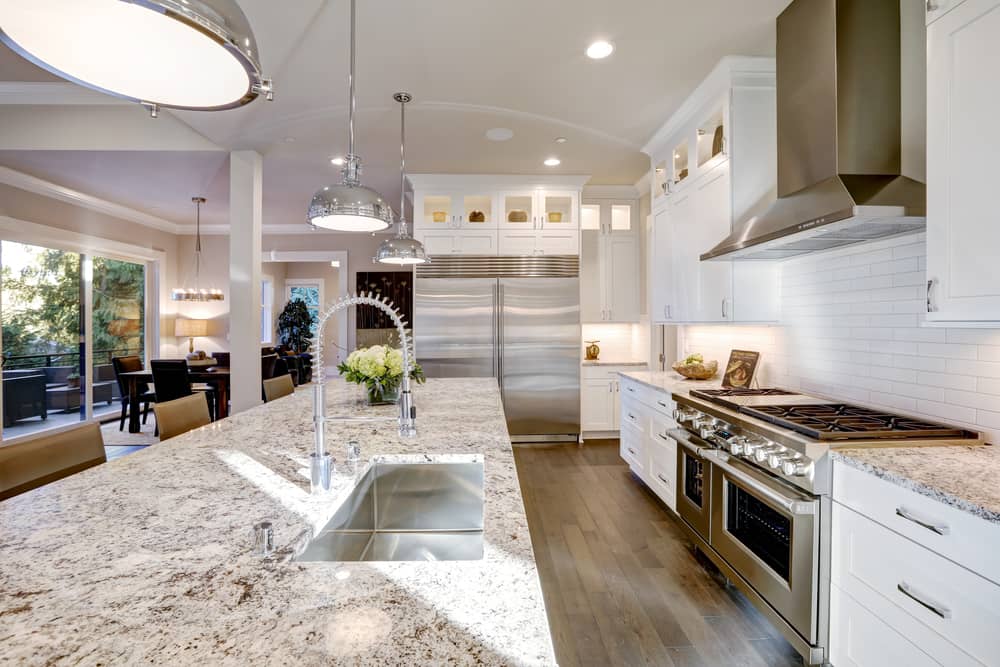One of the most popular design choices for kitchens is stone benchtops. They look fantastic and add a touch of luxury to your kitchen.
Because stone benchtops are porous, they need to be cleaned and sealed regularly to prevent staining.
In this blog post, we’ll show you how to clean stone benchtops using everyday household items.
Types of Stone Benchtops
First, you need to figure out what type of stone your benchtop is made of. This will determine what cleaners and sealers you can use without damaging the surface.
The three most common types of stone used for kitchen benchtops are marble, granite, and quartz.
Granite
Granite benchtops are a popular choice for kitchens because they’re durable and resistant to scratches, stains, and heat. They are also easy to clean and maintain.
One downside of granite is that it can be expensive, but it’s definitely worth the investment.
You can use mild dish soap or a pH-neutral cleaner for granite benchtops.
Avoid using harsh chemicals or scrubbing too hard, as this can damage the surface.
You should also seal your granite benchtop every six months.
Marble
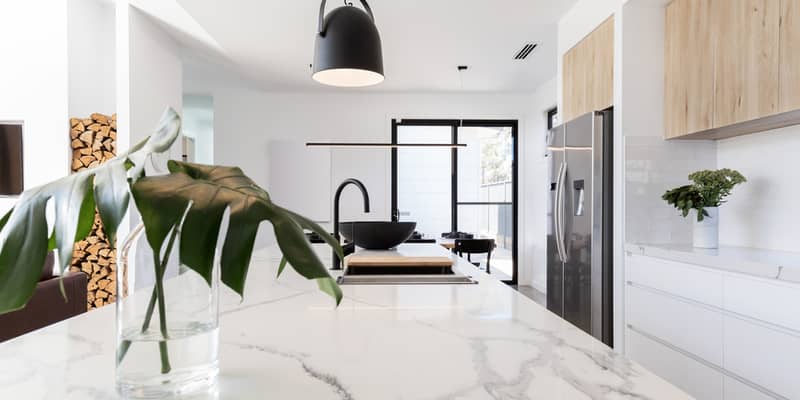
Marble is another excellent choice for kitchen benchtops. It’s known for its sophistication and timeless elegance.
Marble is also heat-resistant and easy to clean, but it’s important to note that it can be susceptible to staining.
To clean marble benchtops, use a pH-neutral cleaner and a soft cloth to avoid damaging the surface.
You should also seal your marble benchtop every six months to prevent staining.
Quartz
Quartz is an artificial material that consists of natural quartz crystals combined with resins and pigments.
It’s available in various colours and patterns, making it a great option if you’re looking for something unique.
Quartz is also non-porous, which means it won’t absorb spills or stains. Plus, it’s extremely durable and low maintenance.
As with granite, avoid using harsh chemicals or scrubbing too hard when cleaning quartz benchtops.
You don’t need to seal quartz because it is non-porous; however, you should still clean it regularly to prevent the build-up of dirt and bacteria.
You may have also heard of Caesarstone before – this is a luxe engineered stone made from up to 90% quartz. Check out our Caesarstone cleaning guide if this is the benchtop material you have in your home.
The Best Ways to Clean Stone Benchtops
To clean stone benchtops, you’ll need the following items:
- Warm water
- Mild dishwashing soap
- Soft cloth or sponge
- Paper towel roll
- Baking soda
- White vinegar
- Hydrogen peroxide (optional)
How To Clean Stone Benchtops
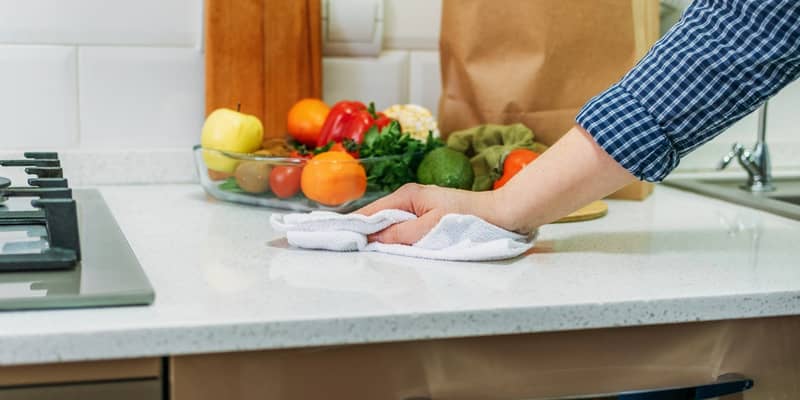
- Start by mixing warm water and mild dishwashing soap in a bowl.
- Dip your sponge or cloth into the soapy water, then use it to wipe down the benchtop surfaces. Pay special attention to areas that are stained or greasy.
- Rinse the soap suds off with clean water.
- If there are any remaining stains, mix equal parts baking soda and white vinegar. Apply the mixture to the stain, then scrub with a sponge or soft brush.
- Rinse away the mixture with clean water.
- If any stubborn stains are left, apply hydrogen peroxide directly to the stain and let it sit for several minutes before scrubbing it with a sponge or soft brush. Rinse away with clean water when finished.
- Dry the benchtop with a clean cloth to prevent water spots from forming.
How to Clean Stained Stone Benchtops
Identify the type of stain you’re dealing with. Is it a water stain? A coffee stain? Something else entirely? Once you’ve identified the type of stain, you can select the appropriate cleaning solution.
- For water stains, a simple mixture of dish soap and warm water should do the trick. Just be sure to rinse the soap off well when you’re finished so that your countertop doesn’t end up with a soapy residue.
- Coffee stains can be more difficult to remove. A 50-50 mixture of water and white vinegar is usually effective, but you may need a stronger solution for tough stains. You can also try using baking soda on coffee stains; make sure to rinse it off well afterwards so that your countertop doesn’t end up with a chalky residue.
- Like your favourite shirt, your stone benchtop can suffer from oil stains. But it’s not hard to get those unsightly stains out. Blot up any excess oil with a paper towel. Then, sprinkle baking soda on the stain and let it sit for 10 minutes. Next, use a damp cloth to scrub the baking soda into the stain in a circular motion. Rinse the area with warm water and wipe it dry with a clean cloth.
How to Clean Engineered Stone Benchtops
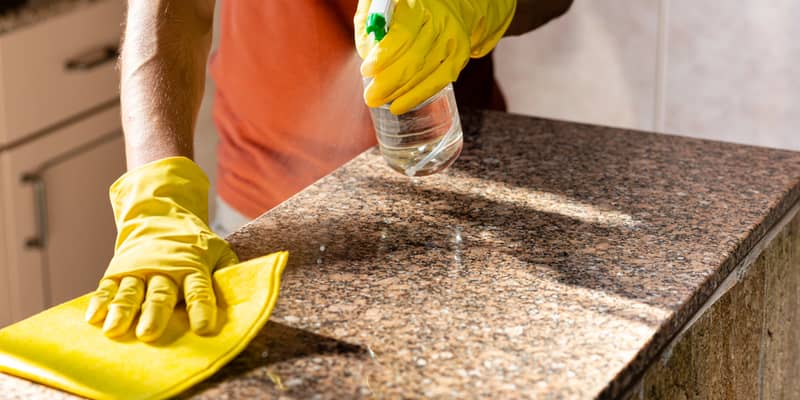
1. Clean up spills as soon as they happen
Engineered stone is porous, which can absorb spills and stains if they’re not cleaned up immediately.
So, if you spill something on your benchtop, be sure to wipe it up with a damp cloth right away.
2. Use mild soap and water for everyday cleaning
For day-to-day cleaning, all you need is some mild soap and water.
Avoid using harsh chemicals or abrasive cleaners, as these can damage the surface of your engineered stone benchtop.
Instead, mix a tablespoon or two of mild dish soap with some warm water in a spray bottle, and use this solution to wipe down your kitchen benchtop after each use.
3. Avoid putting hot pots and pans directly on the surface
Though engineered stone is heat resistant, it’s still a good idea to avoid putting hot pots and pans directly on the surface.
Over time, this can cause discolouration or other damage.
So, if you’ve just taken something out of the oven or off the stove, be sure to use a trivet or pot holder before setting it down on your kitchen benchtop.
4. Polish regularly with a quality sealer
To keep your stone benchtop looking shiny and new, it’s important to polish it regularly with a quality sealer.
Once every few months, apply a thin layer of sealer with a soft cloth and then buff it dry with another soft cloth.
This will help to protect the surface of your benchtop from stains and scratches.
How to Clean White Stone Benchtops
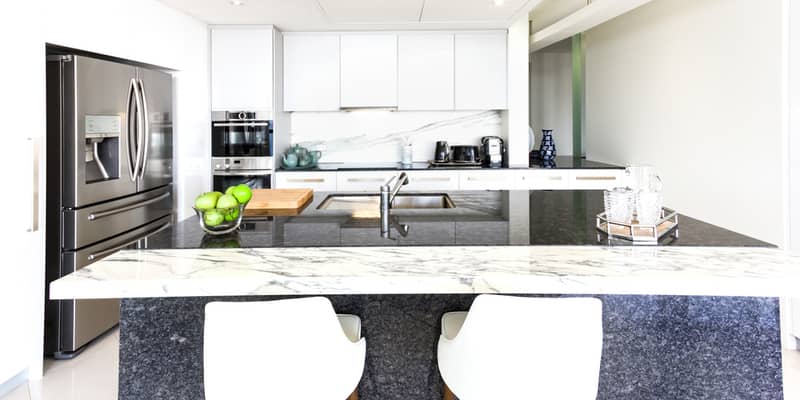
- Start with the basics. Use warm water and a mild dishwashing liquid to rinse away any spills or marks. For tough stains, you can use a little vinegar or bicarbonate of soda.
- Use a soft cloth or sponge — never anything abrasive like steel wool pads, which will scratch the surface.
- Dry the benchtop straight away with a clean paper towel or microfibre cloth.
- To disinfect, use a mixture of one part water to one part hydrogen peroxide, or buy a stone benchtop cleaner. Be sure to rinse thoroughly afterwards so there’s no residual bleach left on the surface.
- For an extra shine, you can buff the surface with a polishing cloth designed for stone benchtops.
How to Clean Black Stone Benchtops
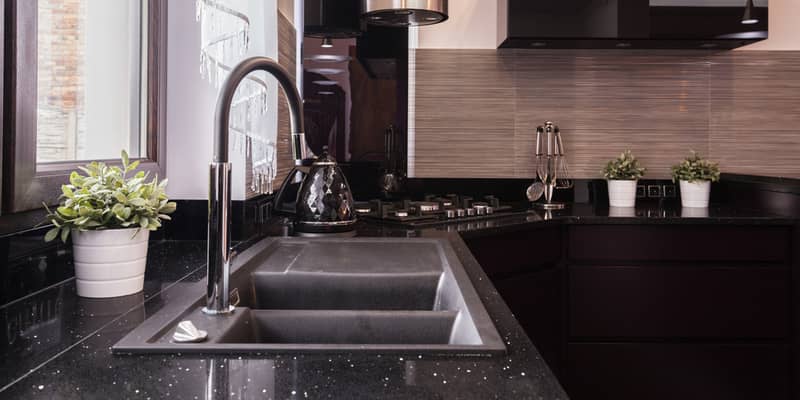
- Start by dusting the benchtop with a soft cloth or feather duster. This will remove any build-up of dirt or dust.
- If there are any stubborn marks, you can use a mild soap and warm water to wipe them away gently. Avoid using harsh chemicals or abrasive scrubbing pads, as these can damage the surface of the stone.
- Once you have removed all the marks, rinse the area with clean water and dry it with a soft cloth.
- To keep your black stone benchtop looking its best, you should seal it every few months. This will help to protect it from stains and make it easier to keep clean.
Caring for Your Stone Benchtop
- Use a non-abrasive cleaner. You want to avoid using anything that will scratch or damage the surface. Instead, opt for gentle dish soap or an all-purpose cleaner. Avoid using harsh chemicals as they can discolour the stone.
- Wipe up spills immediately. This will help prevent stains from setting in and becoming difficult to remove from your kitchen benchtop. If you get a stain, try using baking soda and water paste. Apply it to the stain and let it sit for 15 minutes before wiping it away with a damp cloth.
- Don’t use harsh scrubbers. Avoid using abrasive scrubbers such as brillo pads or steel wool pads when cleaning your white stone benchtop. These can scratch the surface of the stone and leave behind unsightly marks. Instead, use a soft cloth or sponge when cleansing the area.
- Don’t put hot pans on your stone benchtop. Use a trivet or mat to protect the surface from heat damage.
- Use the right sealant. Apply a thin layer of sealant using a lint-free cloth. Be sure to cover the entire stone surface, including any seams or edges. Allow the sealant to dry for 24 hours before using the benchtop. For best results, reapply the sealant every six months.
Never Take Quartz for Granite
A sparkling clean benchtop is the key to a well-kept kitchen. But let’s face it, sometimes our home cleaning efforts just don’t cut it.
If your stone benchtop could use a little love, it might be time to call a professional house cleaner.

